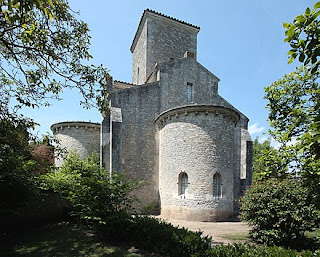Born in the mid 8th century in Visigothic Spain, the Moorish occupation drove him to Aquitaine, eventually joining a monastery in Gaul under Benedict of Aniane. Traveling to Rome in 786, he was impressed by the numerous schools he saw, and wrote letters to abbots and bishops in Gaul, encouraging them to create public schools.
Back in Gaul, Charlemagne was impressed by Theodulf's appreciation of learning and made him Bishop of Orléans and put him in charge of many monasteries. Charles relied on him for theological advice and to establish many schools. Theodulf knew Greek and Hebrew, and was tasked by Charlemagne to make new translations of many works into Latin. He produced many original works as well, including one reminding priests of the importance of manual labor and chastity, poems and hymns, and a codification of what penance was necessary for different sins.
It is also very likely that Theodulf was the author of the Opus Caroli regis contra synodum ("The work of King Charles against the Synod"), known usually as Libri Carolini ("Charles' Books"), commissioned by Charlemagne to counter the work of the Second Council of Nicaea regarding the use of sacred images. (You can purchase an English translation here.)
In 806 he built an oratory at Germigny-des-Prés (the remaining part is pictured above), patterned after Charlemagne's palace at Aachen. It was mostly destroyed by the Normans after 1066, which deprived the modern world of all its art except the only surviving Carolingian mosaic (badly restored in the 1860s) depicting the Ark of the Covenant. The Ark of the Covenant was probably an important image because it represents God's approval of religious images.
Theodulf was a witness to Charlemagne's will, and after the emperor's death in 814, served his son, Louis the Pious. An incident involving Louis' nephew, King Bernard of Italy, led to Louis accusing Theodulf of conspiring against him, and the bishop was imprisoned.
But that's a story for tomorrow. See you then.

No comments:
Post a Comment
Note: Only a member of this blog may post a comment.